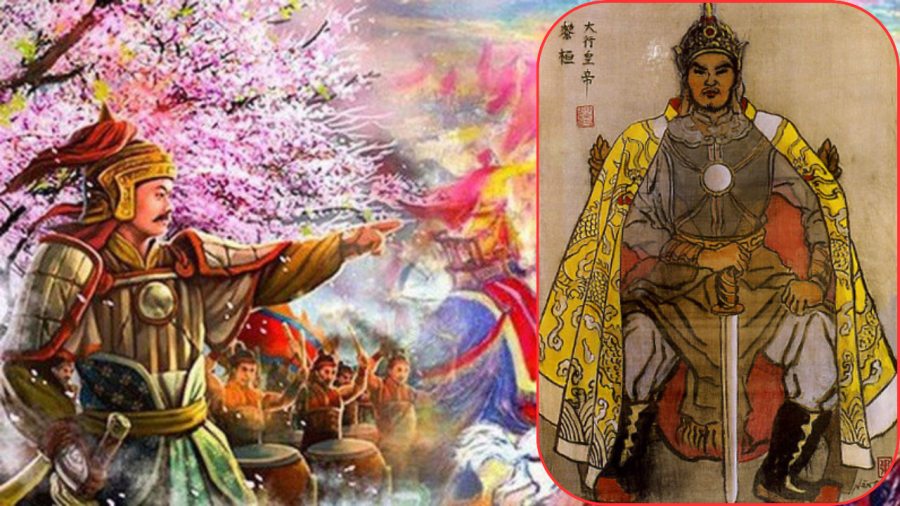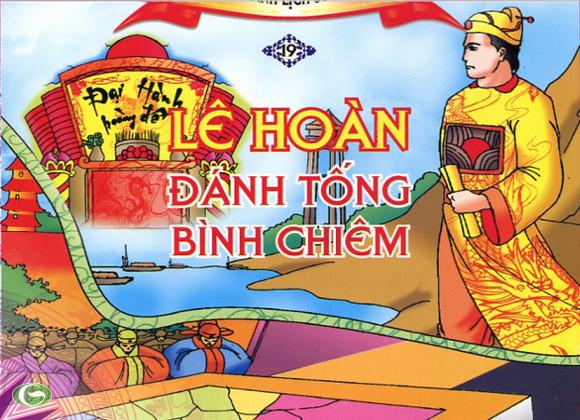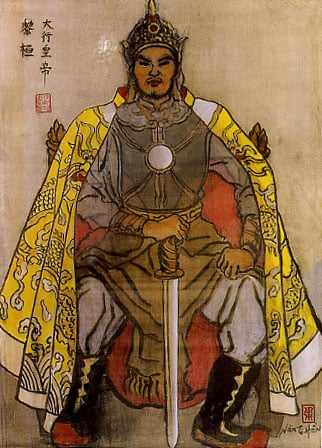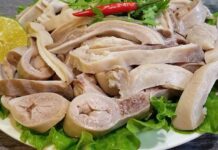Lê Hoàn (Lê Đại Hành) was the king who established the Early Lê Dynasty. Historian Ngô Sĩ Liên once wrote: “Wherever the king fought, he won. He defeated the king of Chiêm Thành to wash away the shame of his captured envoys, and he defeated the Triệu Tống army to break the invincible plan of my king. He can be called the greatest hero of his time.”

According to the book “Đại Việt sử ký toàn thư”, Lê Đại Hành’s noble name was Lê Hoàn. He was the first king of the Early Lê Dynasty, reigning from 980 to 1005. He is listed as one of the 14 most outstanding national heroes of Vietnam. According to “Đại Việt sử ký toàn thư”, Lê Hoàn was born on the 15th day of the seventh month in the year Tân Sửu (which is equivalent to the 10th day of the eighth month in the year 941). As for Lê Hoàn’s birthplace, until now historians have not been able to come to a conclusion whether it is in Ninh Bình, Thanh Hóa, or Hà Nam.
During the suppression of the 12 provincial officials, Lê Hoàn demonstrated his talent early on. However, because he was still young, his position was still below the close friends of the former king. Only when he became the Minister of Justice, directly in charge of the fate of the country, did his talent fully manifest. Not only the veteran generals of the Đinh Dynasty but also the northern generals were no match for him. Although later generations may debate whether his suppression was justified or not, no one can deny his military prowess.

Lê Đại Hành was a king whom “the Chinese envoys had to respect, and the Sơn raiders had to end their rebellion”. He built the magnificent capital of Hoa Lư, surpassing the Đinh Dynasty. He also paid attention to the people’s welfare, cared about the government affairs, emphasized agriculture, enforced border security, established laws, and selected soldiers… He can be described as hardworking and dedicated. He was a talented king who suppressed internal rebellions, skillfully negotiated, and maintained the dignity of the nation without being oppressed by powerful countries.
Lê Đại Hành proved himself to be a selfless king, working for the common good rather than personal grudges. He executed Phạm Hạp for his rebellious acts but still hired his brother Hạp as Phạm Cự Lạng, promoting him to the rank of Commander. The son of Nguyễn Bặc – another person who was killed alongside Phạm Hạp – Nguyễn Đê was also appointed as a military official in the Early Lê Dynasty. Lê Đại Hành was so trusting that he did not anticipate that in the future, Nguyễn Đê would be the one to help Lý Công Uẩn ascend the throne instead of the Early Lê Dynasty.
In addition, the close friends of the former king such as Trịnh Tú and Lưu Cơ – two persons who were in the quartet “Điền, Bặc, Tú, Cơ” under King Đinh since the Hàn Vi period – were also respected and not persecuted or dismissed for being “part of the same faction” as Nguyễn Bặc and Đinh Điền.
Lê Hoàn opened up and established the basic principles of Đại Việt’s diplomacy. The Tống Dynasty was the most powerful feudal dynasty in contemporary Asia with an expansive ideology that had to gradually acknowledge the strength and influence of Đại Cồ Việt, an independent country. They bestowed Lê Hoàn with high titles such as Giao Chỉ Quận Vương (Duke of Giao Chỉ) and Nam Bình Vương (Duke of Nam Bình). Tống envoys even composed poems praising the talent of Lê Hoàn, equal to that of the Tống king. Phan Huy Chú commented:
– The Early Lê Dynasty received Tống envoys with great care and courtesy. They even composed beautiful verses to show off the talented people and gain the respect of the northerners who had to submit.
The king employed a flexible, clever yet resolute diplomatic policy. Once, a Tống envoy demanded that the king kneel to receive the royal seal of the Tống king, but Đại Hành claimed to have a leg injury and could not kneel. The Tống envoy was helpless. To avoid the hassle and expense of receiving envoys, Lê Đại Hành also proposed that Tống only send messengers to the border to deliver letters, and the Hoa Lư court would send someone to the border to receive the Tống king’s edict, which the Tống king had to agree to.

In the book “Đại Việt sử ký toàn thư”, there is a record of the king arranging for the French monk Pháp Thuận to disguise himself as a boatman to pick up the envoy Lý Giác. The story of these two people borrowing the poem “Vịnh ngỗng” by Lạc Tân Vương of the Tang Dynasty to compose verses for each other when they saw two geese swimming on the surface of the river was very intriguing and captivating, becoming an interesting legend in diplomacy and literature. Later, when returning to the embassy, Lý Giác wrote a letter expressing his intention to “honor Lê Hoàn as much as the Tống king” as the great teacher Khuông Việt said.
Lê Hoàn not only made significant contributions to resisting the northern Tống army, the southern Chiêm army, and safeguarding and consolidating the independence of Đại Cồ Việt but also accomplished much in the fields of diplomacy, nation-building, and development. Lê Hoàn also laid the foundation and conditions for Lý Công Uẩn to move the capital from Hoa Lư to Thăng Long in 1010, ushering in a long-lasting era of cultural development for Thăng Long – Hà Nội, the present capital of Vietnam.
Another admirable quality of Lê Hoàn is his policy of employing people based on tolerance and valuing talent, not for personal reasons that would alienate him from the public. He was able to gather human resources and strengthen his power within the country, overcoming difficulties at a time when both the South and the North were threatened. That is something not every king in Vietnam could achieve. And Lê Hoàn has left valuable lessons for future generations about nation-building and preservation.


































